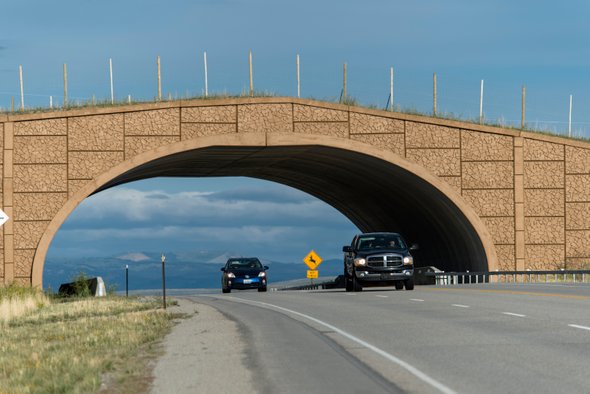(单词翻译:单击)
听力文本
This is Scientific American — 60-Second Science. I'm Jason Goldman.
Ever hear of the pronghorn antelope in the American West? Well, it's not really an antelope — it's actually more closely related to giraffes than to true antelopes. And the last known migration of pronghorns occurs between Grand Teton National Park and the upper Green River Basin in western Wyoming. The so-called "path of the pronghorn" stretches more than 150 miles and is one of the longest mammal migration corridors that remain in North America.
That stretch is also the only federally designated wildlife migration corridor. The trouble is that the corridor intersects with roads and fences, presenting obvious problems to the animals.
So Wyoming officials built eight wildlife crossings along some 12 miles of U.S. Highway 191: two overpasses and six underpasses. But having a crossing doesn't mean wildlife will use it. So researchers decided to assess the impacts of the $9.7-million investment.
"We're out in the field, on spotting scopes, watching these animals as they're approaching brand-new structures. This was a perfect setting, because we had been studying these pronghorn, these animals on their long-distance migration, for about a decade."
Wildlife Conservation Society biologist Renee Seidler, now at the Idaho Department of Fish and Game.

She focused her observations on an area called Trapper's Point. Twice a year, between one (thousand) and two thousand pronghorn, along with some 3,000 mule deer pass through the area. Archaeological evidence indicates that pronghorn have been moving through Trapper's Point for at least 6,000 years. But now they have to contend with highways and fast cars. Before the wildlife crossings were built, the 12 miles of the two-lane Highway 191 saw an average of 85 animal-vehicle collisions each year.
"We looked at how many times an animal would attempt to use the crossing structure before they were able to successfully get to the other side. And the success rate of crossing within that definition increased over time."
In other words, the pronghorn eventually learned to use the crossing. And that's good news for motorists, too: Seidler found a 70 percent reduction in wildlife-vehicle collisions. The results are in the journal Global Ecology and Conservation.
Four years after the crossings were built, every single pronghorn successfully used them to avoid the highway and complete their migration.
"These are migrations that have been compared to migrations on the Serengeti in Africa. These are stellar, long-distance migrations, and I think as a culture we should hold innate pride in that... Wyoming did a really good thing when they put in these crossing structures and fences, so that these animals can continue their migration."
Thanks for listening for Scientific American — 60-Second Science Science. I'm Jason Goldman.
参考译文
这里是科学美国人——60秒科学。我是杰森·古德曼。
听说过美国西部的叉角羚吗?嗯,其实它并不是羚羊,从关系上来说,比起真羚羊它更接近长颈鹿。目前已知的最后一次叉角羚迁徙发生在大提顿国家公园和怀俄明州西部上绿河流域之间。所谓的“叉角羚之路”绵延150多英里,是北美尚存的最长的哺乳动物迁徙走廊之一。
这条路段也是联邦政府唯一指定的野生动物迁徙走廊。但问题是,这条走廊与道路和栅栏交汇,这给动物们带来了明显的问题。
因此,怀俄明州官员在美国191号高速公路沿途12英里修建了8个野生动物通道:2个天桥和6个地下通道。但修了通道并不意味着野生动物就会使用。因此,研究人员决定评估这笔970万美元投资的影响。
“我们在野外用望远镜观察这些动物靠近新建筑结构的情况。这是绝佳的观察地点,因为我们研究叉角羚长途迁徙已经有近10年时间了。”
蕾妮·塞德勒是野生动物保护协会的生物学家,现在在爱达荷州渔猎部任职。
她主要在一个被称做“诱捕点”的地方进行观察。1000至2000只叉角羚以及大约3000只长耳鹿会穿过这一地区,每年两次。考古证据表明,至少6000年来,叉角羚一直在穿越“诱捕点”。但现在它们不得不与高速公路和疾驰的车辆竞争。在野生动物通道修建之前,这12英里长的191号高速公路双车道路段,平均每年会发生85起动物与车辆相撞事故。
“我们关注的是,动物要尝试穿越通道多少次才能成功到达另一边。在这一界定下,动物的穿越成功率随时间而增加。”
换句话说,叉角羚最终学会了使用这种通道。这对汽车司机来说也是个好消息:塞德勒发现,野生动物与车辆相撞的事故减少了70%。这项研究结果发表在《全球生态和保护》期刊上。
在通道建成4年后,每只叉角羚都能成功地使用通道来避开高速公路,以完成它们的迁徙。
“这些迁徙可与非洲塞伦盖蒂平原上的大迁徙相提并论。这些是出色的长途迁徙,我认为作为一种文化,我们应该对其抱有一种与生俱来的自豪感。怀俄明州修建这些通道和围栏的确是件好事,因为这确保了这些动物得以继续它们的迁徙。”
谢谢大家收听科学美国人——60秒科学。我是杰森·古德曼。
译文为可可英语翻译,未经授权请勿转载!
重点讲解
重点讲解:
1. focus on 集中(注意力);关注;
The research effort has focused on tracing the effects of growing levels of five compounds.
研究重点追踪了5种化合物含量上升的影响。
2. along with 与…一起;
The baby's mother escaped from the fire along with two other children.
婴儿的母亲和另外两个孩子一起逃离了火海。
3. at least (数量)至少,不少于;
He had been sitting on the document for at least two months.
他已经将这份文件压了至少两个月。
4. contend with 竞争;争夺;
It is time, once again, to contend with racism.
又一次到了与种族主义战斗的时刻了。


